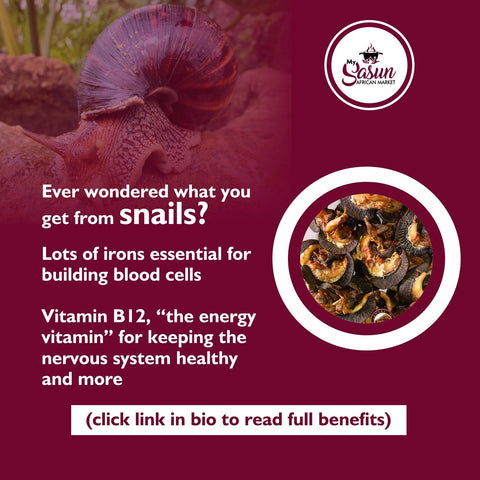If you are looking for a way to spice up your healthy diet, you might want to consider adding snails to your menu. Snails are not only delicious and versatile, but they are also packed with health benefits that can boost your well-being.
Snails are a delicacy in many African countries, especially Nigeria, where they are often cooked in spicy sauces or soups. However, some people have misconceptions or superstitions about snails, and they miss out on the opportunity to enjoy this nutritious food.
At My Sasun African Market, we want to change that. We are a leading online store that offers a variety of African products, including fresh and frozen snails. We source our snails from reputable farms that follow high standards of hygiene and quality. We also deliver to your doorstep, so you can enjoy the convenience and freshness of our products.
But why should you eat snails? Here are some of the reasons why snails are a great addition to your healthy diet:

- Snails are rich in protein and iron.
Protein is essential for building and repairing muscles, organs, and tissues. Iron is vital for transporting oxygen in the blood and preventing anaemia. Snails provide about 15% protein and 3.5 mg of iron per 100 g of edible portion, which is higher than most meats and seafoods.
Also read: THE MOST DELICIOUS SNAIL STEW
- Snails are low in fat and calories.
If you are trying to lose weight or maintain a healthy weight, snails are a good choice. They contain only 2.4% fat and 80% water, which means they are low in calories and cholesterol. Snails are also a good source of omega-3 fatty acids, which are beneficial for the heart and brain.
- Snails are rich in vitamins and minerals.
Snails contain vitamin A, which supports the immune system and vision. They also contain calcium, which strengthens the bones and teeth. Snails are also a good source of magnesium, phosphorus, selenium, zinc, and copper, which are important for various bodily functions.
Also Read: FIVE MEALS YOU CAN PREPARE WITH SNAILS
- Snails are delicious and easy to prepare.
Snails have a mild and slightly sweet taste, which can be enhanced by various seasonings and sauces. You can cook snails in different ways, such as boiling, frying, baking, or grilling. You can also use snails in various dishes, such as salads, stews, pies, or pasta.
Rounding Off:
As you can see, snails are a wonderful food that can improve your health and satisfy your taste buds. If you want to try snails for yourself, you can order our frozen jumbo snail from My Sasun African Market today. We also have other African products, such as spices, grains, oils, beverages, and more.
Don't miss this chance to add snails to your healthy diet. Visit our website and place your order now. You will love our snails and our service. We guarantee it.






Comments (8)
Good news — I got back 160,870 of my BITCOIN that was stolen in an investment scam! 🙌 Huge thanks to Brunoe Quick Hack, and the team who worked with me and law enforcement to trace and recover the funds. Whats-APP +(1) 70578-42635
If you ever face something similar: don’t panic, keep every message and transaction record, and get help from verified pros — scams can be beaten when you act fast and use the right channels. Email: BrunoeQuickHackATgmail.com
I was searching for a loan to sort out my bills & debts, then I saw comments about Blank ATM Credit Cards that can be hacked to withdraw money from any ATM machines around you . I doubted this but decided to give it a try by contacting {rickatmcardoffer@gmail.com} they responded with their guidelines on how the card works. I was assured that the card can withdraw EUR 10,000 instant per day & was credited with EUR 50,000,000 so i requested for one & paid the delivery fee to obtain the card, after 24 hours later, i was shock to see the UPS agent in my resident with a parcel{card} i signed and went back inside and confirmed the card work after the agent left. This is no doubt because I have the card & have made use of the card. These hackers are Germany and USA based hackers set out to help people with financial freedom!! Contact Mr Rick for help if you want to get rich with this and pay off your bills Via: rickatmcardoffer@gmail.com OR Whats-app via +1-920-251-9233 Best Regard
FINALLY I GOT MY LOST BITCOIN BACK ALL THANKS TO TSUTOMU SHIMOMURA
Hello everyone I want to use this Medium to say big thank you to TSUTOMU SHIMOMURA for they helped me recover my stolen crypto worth $250,000 through their hacking skills I tried it I was skeptical but it worked and I got my money back, I’m so glad I came across them early websites . you can also contact them via Email address tsutomushimomurahacker@gmail.com, Or WhatsApp] +1 470 5318 087 and I’m sure you will be happy you did.
FINALLY I GOT MY LOST BITCOIN BACK ALL THANKS TO TSUTOMU SHIMOMURA
Hello everyone I want to use this Medium to say big thank you to TSUTOMU SHIMOMURA for they helped me recover my stolen crypto worth $250,000 through their hacking skills I tried it I was skeptical but it worked and I got my money back, I’m so glad I came across them early websites . you can also contact them via Email address tsutomushimomurahacker@gmail.com, Or WhatsApp] +14705318087 and I’m sure you will be happy you did.
Am here to let the whole world know that I was diagnose of herpes 3 years ago where all hope was lost and I had nothing to do about it,I just accepted the faith that one day I will cure of this disease and I just pray everyday for a helper and one day my sister introduce me to a herbal doctor man called Dr ahonsie that she saw him on internet well I contact him on his email,I was not fully convinced until he sent me the herbal medicine which he ask me to take for two weeks I took it with faith and i went for a retest in different hospitals and today am cured of this disease and am also using this medium to let all those having STD,like herpes and the rest not to give up,their is a man who can cure you,his name is Dr ahonsie . contact the great herbalist via his Email: drahonsie00@gmail.com / WhatsApp: +2348039482367. https://drahonsie002.wixsite.com/dr-ahonsie
I thought the physicians says there is no cure for HSV 2!!! I am telling you today that Dr ahonsie cure HSV 2 with his herbal medicine and once you get cured you are cured forever it is never reversible, I have been suffering for this deadly disease called h HSV 2 for more than a 2years and lost all hope because my doctor says there is no cure for HSV 2. Brethren I saw a testimony on the internet on how Dr ahonsie cure HSV, Hapatitis etc with his herbal medication and an email and watsapp to contact him was also displayed, I thought this was joke but I decided to contact him and he replied telling me not to worry that my problem is over . Dr ahonsie sent me a herbal medication to drink for one month but only 2weeks I feel strange and I went to my doctor and he confirmed me negative. He can help you too. Contact him drahonsie00@gmail.com or whatsapp +2348039482367 https://drahonsie002.wixsite.com/dr-ahonsie https://www.facebook.com/drstellaherbalhome?mibextid=ZbWKwL
Being the winner of a multi-million-dollar lottery certainly is a life-changing event for almost every single lottery winner. My name is Mavis Wanczyk from Chicopee, Massachusetts, the famous Powerball lottery winner of $758 million (£591m). I know many people would wonder how I had won the lottery. Would you believe me if I told you that I did it with spell casting? I met this famous spell caster known as Great Odunga and he was the one who did it for me. As shocking as it was to me, my famous comment to the press was “ I’m going to go and hide in my bed.” Never did I believe that Great Odunga made me wealthy overnight. If you want to have your chance of winning and becoming very wealthy just like me, contact Great Odunga at odungaspelltemple@outlook.com OR Email: odungaspelltemple@gmail.com and WHATS-APP HIM at +2348167159012 and you will be lucky. Thanks for reading and hope to see you at the top
3000 renfro road Columbus Ohio 43232